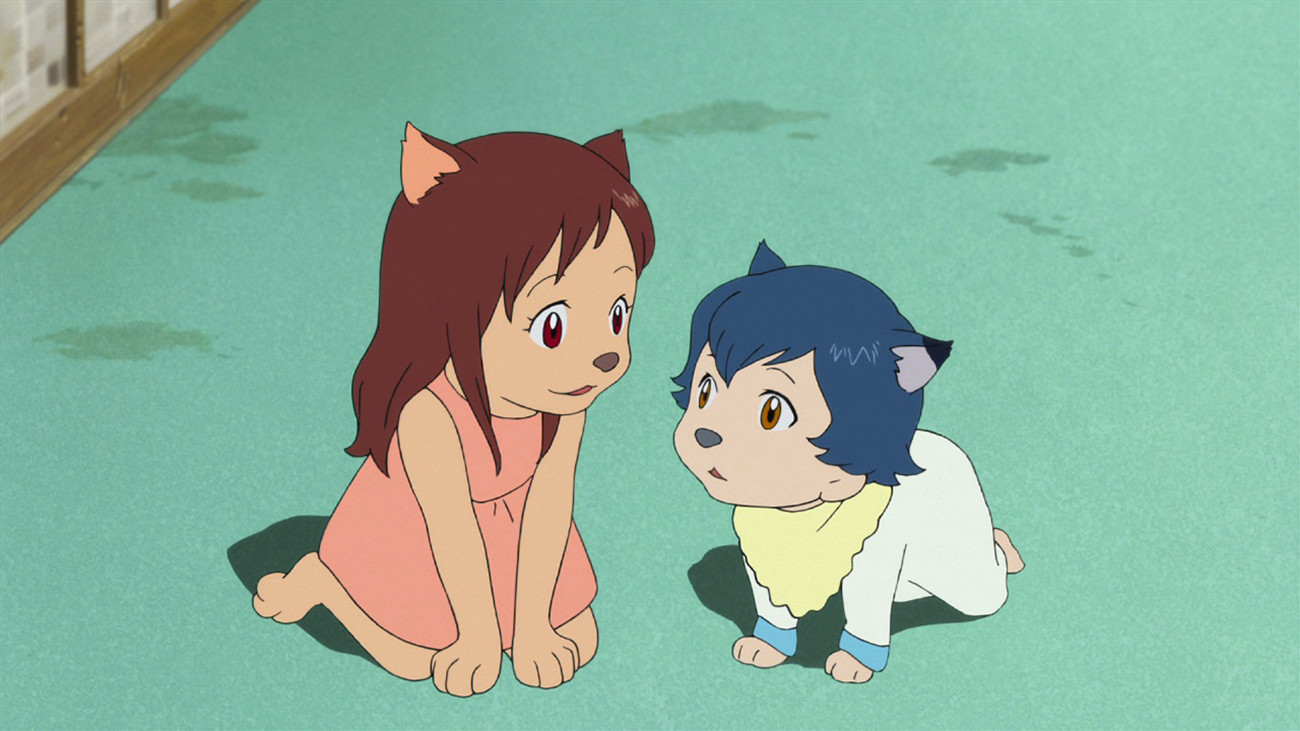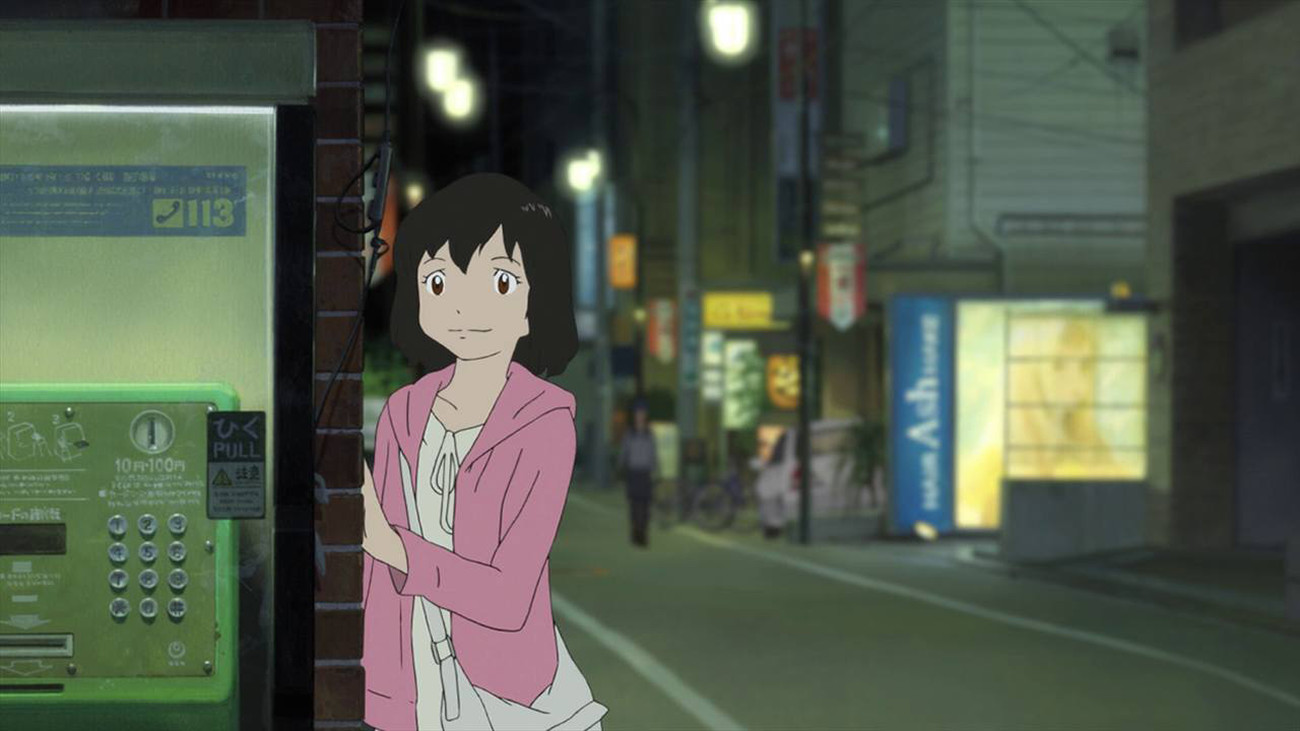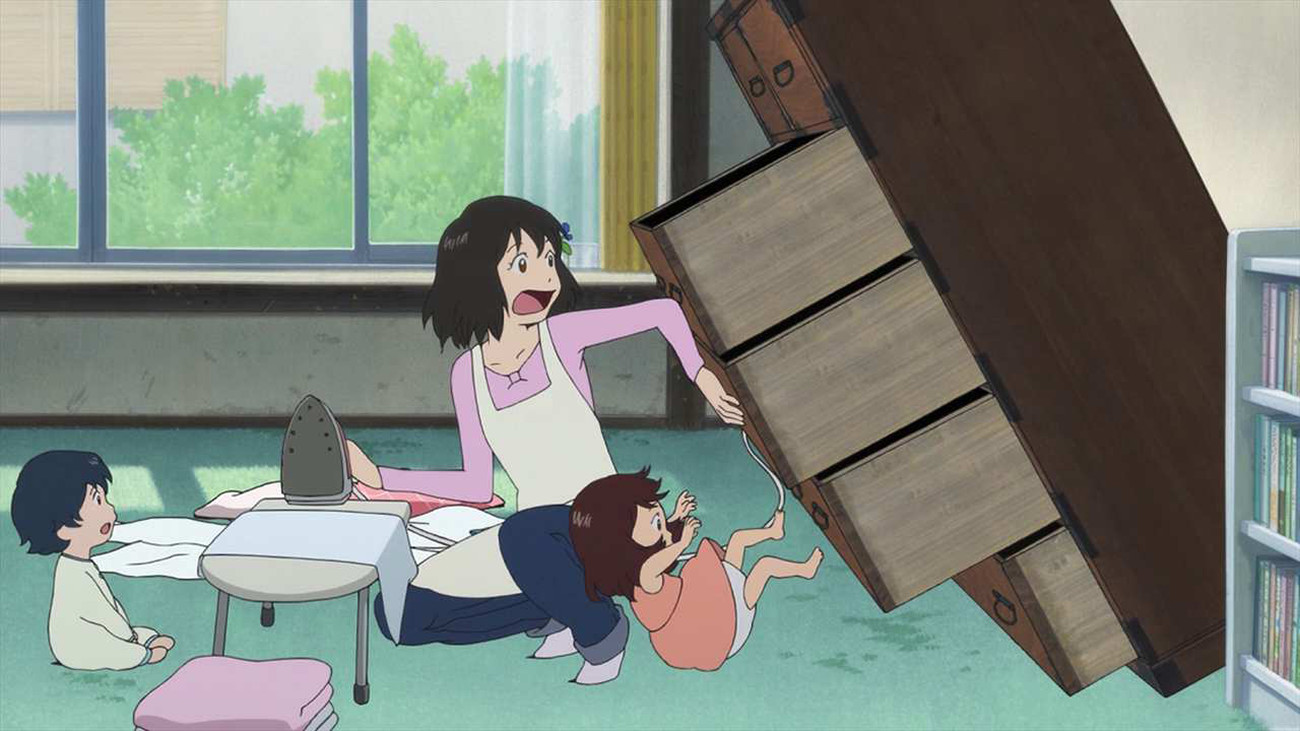This interview is being republished from the now closed JapanCinema.net. It was previously produced by Hieu Chau on April 26, 2013, during Mamoru Hosoda’s promotional tour for Wolf Children.
One of the reasons why I liked Wolf Children so much was because the film felt so sincere and very personal in its depiction of family life. How personal was the film to you?
I think in terms of setting, Wolf Children is a bit different and unique in that we have werewolves and such but in terms of the actual story, I think it’s quite a normal story and that there’s nothing special about it. I feel that because it’s such a normal story, whoever is watching the film can actually personalize it in their own way. By watching the movie, they can feel differently towards it and I think that’s why the film may have felt so personalized.
That’s interesting because I did feel that the film’s story was quite ordinary but at times, it felt a like an anime version of a Yasujiro Ozu film.
I’m really happy that you saw my film that way! As you know, Yasujiro Ozu’s films are quite quiet and very calm. They depict very normal situations but by actually looking at very familiar situations you can actually feel the importance of the little things in life. In turn, that feeling becomes incredibly personalized and really reaches out to you. So for you to have seen it like that or for others to potentially take to my film like Ozu’s films, I’m really grateful.
As I was watching the film, I had begun to realize how difficult it would be to tell this kind of story in a live-action setting as well.
I have had people who have watched Wolf Children say, “Oh, you could turn this into a live-action movie!” but I agree that it would be quite difficult to make as a live-action movie because, as you know, the story is about these children who could become either humans or wolves.
Is there a reason why you prefer to tell stories through animation? Would you ever consider doing a live-action film?
No, I don’t think I would want to make live-action movies and that’s partly because I want to make movies that can only be expressed by the imagination. I’m sure there are lots and lots of stories that need to be re-created by animation and that’s what I would like to do. For example with Wolf Children, I think that it’s never been done in world of cinema and that it could only exist because of animation.

I read online that you were invited to visit Pixar and that you also screened Wolf Children for them. What did they think of the film?
Yes, that happened around last September, if I recall correctly. I had a private Wolf Children screening with the Pixar staff. They took it really seriously and they really enjoyed it. It raised a lot of interest too because it was about the same time that Pixar released Brave in Japan.
You worked with Studio Ghibli for a brief period of time. What did you learn from that experience as a filmmaker when you worked with them?
At the time, I didn’t have any experience making feature-length films. I was involved with them when they were trying to make a feature length-film but that didn’t work out very well. It made me aware that you just can’t make things and will it into happening. It’s almost like a miracle – each creation is a new miracle. Every year, there are many films that are made but I really feel that each film is a product of luck and a lot of talented people. A lot of people who create these films have a miracle.
What I learnt from my Studio Ghibli days was that inspiration doesn’t come naturally. You really have to think that any film you make is a product of all sorts of luck and miracle and that’s perhaps the most important thing that I learnt there.
Across your films, the one theme that seems to be constant is the theme of connection – how important relationships with others are crucial in building character. In Wolf Children, for example, the relationship between Hana and her children end up defining the paths that the children go in life. For you, who was the person that helped you most in building your character and in getting you to where you are today?
I suppose I would say that it was my parents. Before I made the film, I just thought that the idea of parents having and raising children was a natural thing – it was just something that parents had to do, I paid no mind to it because that’s just how it was. But when I made the film, it was about Hana and her thirteen years of raising children and that really made me aware that to have children and to raise children was not something that just happened. It’s almost a miracle and there’s so much put into it.
When I think about that, I realise that I was really lucky that my parents put an effort into my bringing me up. So yes, I would like to say it was my parents that helped me get to where I am now.
That’s very nice of you to say! Very sweet.
(laughs) I would like for people who watch the movie to be able to recollect their experiences and think, “Oh, this is what my parents really thought!” or for them to think about how their parents were to them. That’d be my wish.

Yes, I had the same thoughts when I was saw the movie! While the main character was certainly Hana, I happened to look at the film through the eyes of the children and then from that was able to see how hard it must be to raise a family. I think if I had kids in the future, I’d have a different perspective on the film as well.
I feel that with this movie, people who watch it would feel very different depending on what point in their life they are at that time. I suppose, if you were a child watching it or if you’re a single parent who’s raising children or if the kids have already left the nest, I think the film’s meaning will vary. In the end, it’s a singular movie but depending on the stage of your life, I think you can really enjoy and savour the movie many times.
There’s a great moment in the film where Hana can’t figure out whether or not to take the kids to see a doctor or to the vet and, in many ways, that scene dictates whether or not these kids will grow up to be products of nature or nurture. If we were to ‘time leap’ into the futures of Ame and Yuki, where do you think the children will be and how do you think they will turn out?
I feel that the way in which Hana raised the children was that she was very aware that the two children could be either a wolf or a human and because of that she really tried to provide an environment where they could choose to live as one or the other. And of course, towards the end of the film, the children make their own decisions which end up being quite different to one another.
But yes, I think she deliberately provided the capacity for the children to be able to choose their roles. Both, Ame and Yuki are very different characters but to answer what you said about their futures I think it is really dependent on what the children want.
At the end of the movie, I was surprised to see that actress Aoi Miyazaki voiced the mother, Hana, in Wolf Children. After seeing that, I realized that she’s played a lot of characters similar to Hana in her own films. What was it about Aoi that made you want to choose her to bring Hana to life?
Generally speaking, I always hold auditions to choose the voice actors and I did the same for the character of Hana. I auditioned many people but I just couldn’t find the person that I thought was perfect for the role. As for the roles of the children, I did find people who were perfect for them through the audition process.
But to answer your question as to why I chose Aoi Miyazaki, I suppose… (pauses) I suppose it’s because she’s closest to Hana. My view is that when I choose these people, it’s not because I choose them because they’re really good technically or that they have really good voices – of course all those things are important – but for me, what’s more important is that the actress or actor’s personality, character and way of living – their human element – would have to be close to the character that I want to portray.
That’s why I felt that she was the closest to Hana and that’s why she got the role.
I felt that way too – I felt that her role in the film felt a lot like some of the characters she’s played but also felt like it could’ve been herself in her real-life personality.
I totally feel the same way in that Hana is Aoi Miyazaki and she is the character as well. There’s certainly a lot overlap between the two. I can also say that for the other characters as well.
For example, with Bunta Sugawara who played the old man in the film, I sometimes felt that when he came out from recording he wasn’t actually doing the part but was, more or less, ad-libbing as he was going on and he was just coming up with things for role which in turn made the role and the actor almost identical.

Wolf Children is considered by some to be your first true original film. You adapted The Girl Who Leapt Through Time from a novel and also borrowed elements of your Digimon movie, Children’s War Game, for Summer Wars. Do you feel that there’s more pressure or freedom when you move from adapting material to creating something fresh and original?
I don’t think there’s much of a difference. With The Girl Who Leapt Through Time, although the original author’s work was there, the story I made was only loosely based on it and it really didn’t have much do to with the original story. Similarly with Summer Wars, yes it was based on Digimon but I also created that Digimon film from scratch.
So in that sense, although you could say that they were both adapted works at the same time, they aren’t in terms of their content. And that’s why with Wolf Children, I don’t see there being any difference especially between those previous two movies.
You’ve stated that when you worked on making Summer Wars, part of that film was inspired by your own experience meeting your wife’s family and on Wolf Children, you’ve said that this film was inspired by your initial desire to have a child with your wife. If we follow that natural progression in life, where do you think your next film will take you?
(laughs) Wow, you’ve sure done a lot of research! It seems like you’ve read a couple of other interviews I’ve given but you’ve done some really good research.
Wolf Children, is of course, a story about bringing up children and there are some who have thought that the film is based on my own personal experience but it actually isn’t. We had wanted children, my wife and I, and it had been a bit difficult and I agree in that it was my yearning for children that made me want to create the film. As far as inspiration for a movie however, I think that it could be anything. It has to do with something in life and also has to coincide with chance and opportunity.
Luckily, Wolf Children has been a great success and I would of course like to make movies that people would enjoy but it all depends on where life’s inspirations come from at the time.
What other plans do you have for Studio Chizu? Will we be seeing feature-length films from other animators, apart from yourself, in the future?
Honestly, I don’t know at all, mostly because we just started the production studio. It’s like we’re in the middle of the night and we can’t see anything – we don’t even know if there’s light at the end of the tunnel! Having said that, my aim for the studio would be for it to become a place that makes feature-length animated films. I don’t think we would be doing things in television or making any commercials so we’ll continue to create feature-length animations and we’ll do whatever we need to do.
If things don’t go well, we’ll close up (laughs) but at the moment it’s such a new baby and we’re just unsure as to where things will go from here.
